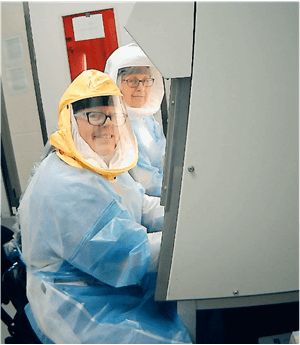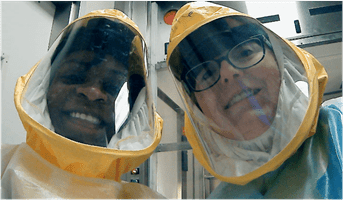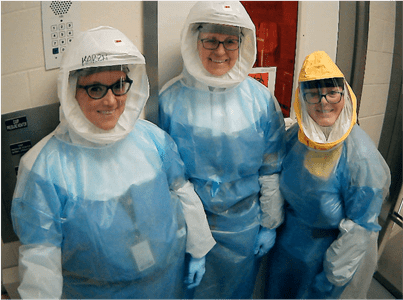One Indiana University School of Medicine researcher is using her study of bone and fracture healing to better understand the effects of COVID-19 on the body. The Kacena Lab in Indianapolis—led by Melissa Kacena, PhD, the Vice Chair of Research for the Department of Orthopaedic Surgery—is the first lab in the state to begin using mouse models to study the novel coronavirus, in hopes of discovering a treatment for the disease.

Kacena diverted her work to COVID-19 when several studies from across the country revealed that people who died from the coronavirus had a high number of megakaryocytes built up in various organs, causing significant issues. Megakaryocytes are large bone marrow cells that produce platelets. These platelets are needed for blood clotting, but Kacena studies their relation to bone regeneration and fracture healing. Her work has led to partnerships with NASA and the U.S. Army.
As scientists from across the globe continually seek answers to questions about SARS-CoV-2, the virus that causes the COVID-19 disease, one discovery they’ve made relates to megakaryocytes—and it sparked Kacena’s interest.
The autopsies of those who died from COVID-19 have revealed significant megakaryocyte build-ups in the heart, lungs and brain. It’s strange for such build-ups to occur in these organs, and Kacena is determined to learn why it’s happening.
She received $15,000 in funding from the Indiana Clinical and Translational Sciences Institute (CTSI) to study whether regulating megakaryocytes could change the severity of COVID-19 and decrease its morbidity and mortality. She’s collaborating with IU School of Medicine faculty members George Sandusky, DVM, PhD, Edward Srour, PhD, and Ziyue Liu, PhD, as well as veterinarian Nancy Johnston, the assistant director of the Laboratory Animal Resource Center (LARC).
The Indiana CTSI has a biobank of blood samples from COVID-19 patients, collected primarily at IU Health Methodist Hospital in Indianapolis. The institute provided Kacena with the samples as well as de-identified information on the patient’s disease severity, including, for example, if the patient died, if they were in the ICU, or whether they needed a ventilator.

Kacena’s research team then examined the blood samples, applying their knowledge of megakaryocytes to each analysis.
As part of this quest to find a therapy for COVID-19, Kacena also acquired transgenic mouse models to aid in her experiments. Hers is one of only a handful of labs in the United States and the only lab in Indiana to be conducting coronavirus-related experiments at this level.
Kacena said finding treatments for COVID-19 is the next essential step in moving past the pandemic. Even as more and more people become vaccinated and the spread of virus slows, treatments will be necessary to aid and heal those who do end up contracting the disease, she said.
Kacena admitted that, when SARS-CoV-2 began spreading, she hadn’t envisioned taking on research related to COVID-19.
For many years, her work has focused on orthopaedics and bone regeneration—never viruses or infectious disease. She never could have predicted that her expertise in megakaryocytes would end up being essential, she said.
It’s proof, she said, that researchers must always keep an open mind, think creatively and be ready to reinvent their work.
